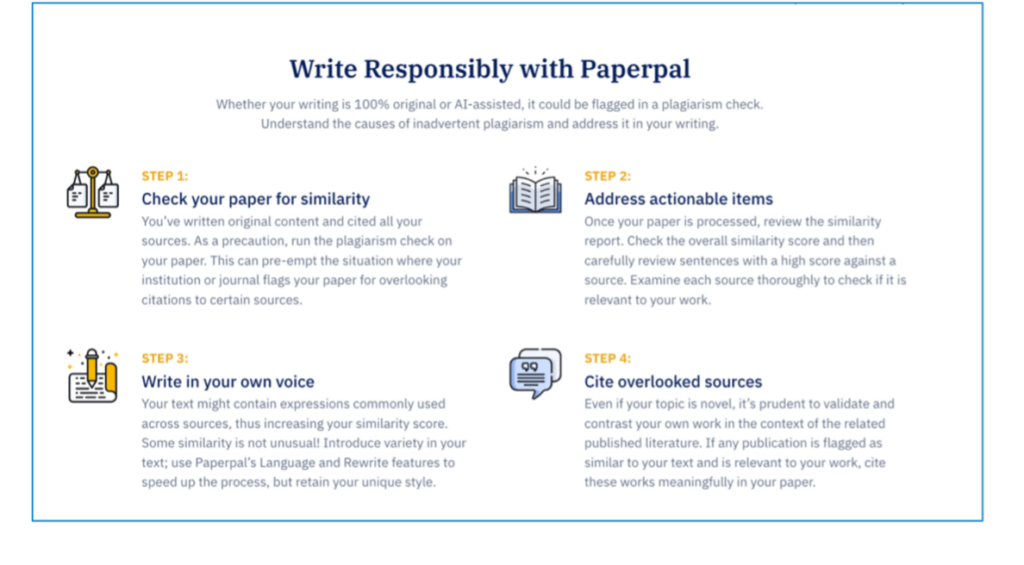With the growing popularity of AI tools among researchers and students alike, concerns about responsible writing with AI and the authenticity of journal and essay submissions have been on the rise. Academics constantly face the challenge of producing quality content while amping up their productivity and number of publications.
The ethical use of AI starts with the right mindset, and Paperpal helps you align on this with the unique guardrails we’ve incorporated into its feature design.
In 2023, we introduced a range of generative AI features on Paperpal. These were designed to assist you at various stages of the writing process while ensuring that you – the author – remain in full control of your writing.
We were particularly cognizant of the attitudes around the use of generative AI for research and the risks of AI hallucination and plagiarism. While we were keen on incorporating generative AI in the writing process, it was important to ensure that it boosts productivity while not completely taking over your writing process. Here’s how we ensure Paperpal encourages responsible writing with AI:
- Generative AI Tailored for Academic Writing
General-purpose generative AI tools like ChatGPT provide generic outputs that may lack academic context. This undermines their usefulness in academic writing, where context and accuracy are paramount to communicating research effectively. Paperpal fills this very gap as it has been trained on academic content to cater to the specific needs of scholarly writing. This ensures that Paperpal ‘gets’ your research and offers suggestions that are relevant to your niche, while also helping you up your productivity game and do away with the need of endless iterations with generic AI tools.
- Emphasis Remains on Human Authorship
To encourage responsible writing with AI, our generative AI features were designed to assist human authorship by steering clear of producing full text. Paperpal will support your academic writing at every stage – researching, outlining, editing, and polishing. The AI academic tool will also provide outlines and advisory snippets, using which you can continue writing and take the manuscript to completion. However, research writing has to be led by you, the researcher – that’s a key guiding principle for us at Paperpal.



- Focus on ‘Human-in-the-Loop’ to Ensure Ethical Use of AI
Paperpal provides language or paraphrasing suggestions to speed up your polishing process. However, the text is intentionally processed only a few paragraphs at a time, requiring you to review the tool’s suggestions section-by-section, add required citations, and ensure authentic, responsible writing with AI. Paperpal also nudges you to review all AI-generated content and recommends you never use this verbatim in your work.

- Regular Coaching on Responsible Writing with AI
At Paperpal, we routinely post educative pieces about the ethical use of AI, and also host webinars on these key aspects. Paperpal’s product messaging also advocates strongly for responsible writing with AI, which reflects our core ethos for its inception and development.

Final Tips on Responsible Writing with AI
To summarize, Paperpal is focused on nurturing and guiding authors towards responsible writing with AI and ensuring that you are following the guidelines recommended for the ethical use of AI. Here are our final recommendations when using generative AI tools for your writing:
- Ensure you know your chosen journal or institute’s guidelines on generative AI tools and follow these when using AI tools to enhance your research journey.
- Avoid using AI-generated text as is, make sure you review for inaccuracies or changes in meaning and incorporate only the required elements.
- Remember to always check and add citations and references where necessary to avoid any risk of potential plagiarism.
Bid adieu to worries about the ethical use of AI and explore the efficiency that AI can bring to your academic writing process. By ensuring responsible writing with AI, you can transform your work and write better, faster, and ethically. Try Paperpal today and experience the difference for yourself!
Paperpal is a comprehensive AI writing toolkit that helps students and researchers achieve 2x the writing in half the time. It leverages 21+ years of STM experience and insights from millions of research articles to provide in-depth academic writing, language editing, and submission readiness support to help you write better, faster.
Get accurate academic translations, rewriting support, grammar checks, vocabulary suggestions, and generative AI assistance that delivers human precision at machine speed. Try for free or upgrade to Paperpal Prime starting at US$19 a month to access premium features, including consistency, plagiarism, and 30+ submission readiness checks to help you succeed.
Experience the future of academic writing – Sign up to Paperpal and start writing for free!



